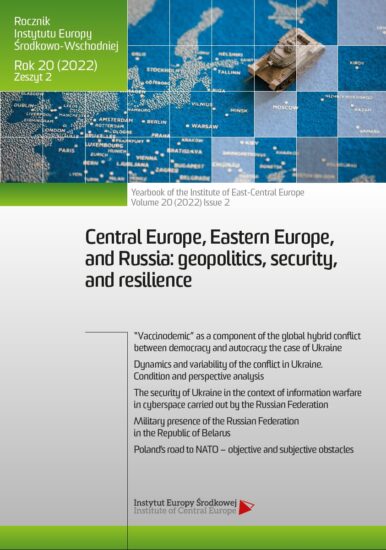Bezpieczeństwo Ukrainy w kontekście wojny informacyjnej w cyberprzestrzeni kreowanej przez Federację Rosyjską
ORCID: Agnieszka Rogozińska: 0000-0002-3462-7851
Afiliacja: Jan Kochanowski University in Kielce, Poland
Pages: 107-122
Edition: Lublin 2022
DOI: https://doi.org/10.36874/RIESW.2022.2.6
Citation method: A. Rogozińska, The security of Ukraine in the context of information warfare in cyberspace carried out by the Russian Federation, „Rocznik Instytutu Europy Środkowo-Wschodniej” 20(2022), z. 2, s. 107-122, DOI: https://doi.org/10.36874/RIESW.2022.2.6.
Abstract: In the public discourse on issues of international security in the context of threats created by the Russian Federation, such threats are determined primarily by actions below the threshold of “war” (of a hybrid nature) and are made using non-military means, e.g. in relation to cyberspace. Actions of this nature are carried out by the aggressor’s special services or groups of hackers and activists associated with them whose aim is to paralyse the functioning of the attacked state (its administration, critical infrastructure). Such activities are multilateral; activity is undertaken in many fields (social media, provocative events, establishing pro-Russian organizations, creating information portals) and is still escalating. The purpose of the research, the results of which are presented in this article, is to identify the activities and assess the impact of Russian information warfare conducted by the Russian Federation in cyberspace in 2014 and 2022 on the security of Ukraine. The research used general-methodological research methods – primarily, analysis and critique of literature. The case study method was used to identify specific examples of information warfare used by the Russian Federation against selected countries in Central and Eastern Europe. Keywords: security, information warfare, cyberspace, Ukraine, Russian Federation Streszczenie: W dyskursie publicznym zagadnienia bezpieczeństwa międzynarodowego w kontekście zagrożeń kreowanych przez Federację Rosyjską determinowane są przede wszystkim przez akcje z użyciem działań poniżej progu wojny (o charakterze hybrydowym) za pomocą środków niemilitarnych, m.in. w odniesieniu do cyberprzestrzeni. Działania o takim charakterze prowadzone są przez służby specjalne agresora lub powiązane z nimi grupy hakerów oraz aktywistów, których celem jest paraliżowanie funkcjonowania państwa atakowanego (jego administracji, infrastruktury krytycznej).
Bibliography:
Attack on Ukrainian Government Websites Linked to GRU Hackers, Bellingcat Investigation Team, https://www.bellingcat.com/news/2022/02/23/attack-on-ukrainian-government-websites-linked-to-russian-gru-hackers/.
Banasik M., Bezpieczeństwo w aspekcie zagrożeń hybrydowych, “Obronność – Zeszyty Naukowe Wydziału Zarządzania i Dowodzenia Akademii Sztuki Wojennej” 2016, no. 3(19).
Broad W.J., Markoff J., Sanger D.E., Israeli Test on Worm Called Crucial in Iran Nuclear Delay, Strategy International, https://strategyinternational.org/experts/mark-voyger/.
Cheda R., Rosyjska wojna informacyjna – lekcja z Ukrainy, Wiadomości WP, http://wiadomosci.wp.pl/kat,1356,title,Rosyjska-wojna-informacyjna-lekcja-z-Ukrainy,wid,17301467,wiadomosc.html?ticaid=118406.
Coynash H., Russia brings ‘humanitarian’ convoys to Ukraine by day, military trucks carrying death by night, Kharkiv Human Rights Protection Group, http://khpg.org/en/1564595792.
Darczewska J., Anatomia rosyjskiej wojny informacyjnej. Operacja krymska – studium przypadku, Ośrodek Studiów Wschodnich, Warszawa 2014.
Fake News of Cyber Attacks Fast-Spreads, as Conflict between Russia and Ukraine Escalates, https://blog.checkpoint.com/2022/03/03/hacktivismin-the-russia-ukraine-war-questionable-claims-and-credits-war/.
Fryc M., Polska strategia obronności wobec zagrożenia militarnego z elementami „wojny hybrydowej”, “Bezpieczeństwo Narodowe” 2015, no. 33.
Gareev M., If War Comes Tomorrow? The Contours of Future Armed Conflict, Routledge–Abingdon 1998.
Hopkins V., A hack of the Defense Ministry, army and state banks was the largest of its kind in Ukraine’s history, The New York Times, https://www.nytimes.com/2022/02/15/world/europe/ukraine-cyberattack.html.
Jonsson O., Seely R., Russian Full-Spectrum Conflict: An Appraisal After Ukraine, “The Journal of Slavic Military Studies” 2015, no. 28.
Kontseptual’nyye vzglyady na deyatel’nost’ Vooruzhennykh Sil Rossiyskoy Federatsii v informatsionnom prostranstve, https://function.mil.ru/news_page/country/ more.htm?id=10845074@cmsArticle].
Kuk A.I., Kanwa wywiadu agenturalnego, Warsaw 1994.
Lewis B.C., Information Warfare, Federation of American Scientists, http://fas. org/irp/eprint/snyder/infowarfare.htm.
Libicki M., What is Information Warfare?, Washington D.C. 1995.
Liderman K., Analiza ryzyka i ochrona informacji w systemach komputerowych, Warszawa 2008.
Mattsson P.A., Eklund N., Russian Operational Art., “The Fifth Period: Nordic And Arctic Applications”, vol. 1, 2013, no. 1, https://www.stratcomcoe.org/peter-mattsson-niklas-eklund-russian-operational-art-fifth-period-nordic-and-arctic-applications.
Messner E.Ye., Khochesh’ mira, Pobedi bunt!, Moskva 2005, http://militera.lib.ru/science/0/pdf/messner_ea01.pdf].
‘NotPetya’ malware attacks could warrant retaliation, says Nato affiliated-researcher, https://www.theguardian.com/technology/2017/jul/03/notpetya-malware-attacks-ukraine-warrant-retaliation-nato-researcher-tomas-minarik.
Nowe sankcje USA wobec Rosji. Uderzają w największe przedsiębiorstwa, Onet Wiadomości, http://wiadomosci.onet.pl/swiat/nowe-sankcje-usa-wobec-rosji-uderzaja-w-najwiek-sze-przedsiebiorstwa/w9lkp.
Olchawa M., Misja Ukraina, Warsaw 2016.
Patterson D., The ransomware wars: Here’s how much cash the top gangs reel in, CNS News, https://www.cbsnews.com/news/ransomware-war-conti-revil-hellokitty/.
Perry B., NonLinear Warfare in Ukraine: The Critical Role of Information Operations and Special Operations, “Small Wars Journal” 2015, no. 1, http://smallwarsjournal.com/jrnl/art/non-linear-warfare-in-ukraine-the-criticalrole-of-information-operations-and-special-operation.
Polityka ochrony cyberprzestrzeni Rzeczypospolitej Polskiej, Ministerstwo Administracji i Cyfryzacji, Warsaw 2013.
Press Briefing by Press Secretary Jen Psaki and Deputy NSA for Cyber and Emerging Technologies Anne Neuberger, 21 March 2022, https://www.whitehouse.gov/briefing-room/press-briefings/2022/03/21/press-briefing-by-press-secretary-jen-psaki-and-deputy-nsa-for-cyber-and-emerging-technologies-anne-neuberger-march-21-2022/.
Rada Europejska, Rada Unii Europejskiej, Kalendarium – sankcje UE wobec Rosji w sprawie Ukrainy, http://www.consilium.europa.eu/pl/policies/sanctions/ukraine-crisis/history-ukraine-crisis/.
Raport OSW. Zmiany w potencjale militarnym Federacji Rosyjskiej (po rosyjskiej operacji wojskowej w Gruzji), Warsaw 2009.
Reisinger H., Golz A., Russia’s Hybrid Warfare: Waging War below the Radar of Traditional Collective Defence, “NATO Research Paper” 2014, no. 105.
Russia unleashed data-wiper malware on Ukraine, say cyber experts, The Guardian, https://www.theguardian.com/world/2022/feb/24/russia-unleashed-data-wiper-virus-on-ukraine-say-cyber-experts.
Sankcje i Rosja, J. Ćwiek-Karpowicz, S. Secrieu (ed.), Warsaw 2015.
Todd D., NB65 Hackers Attacking Russian Orgs in Ukraine Retaliation, https://www.secureworld.io/industry-news/nb65-hackers-russia-ukraine.
Ukraine hit by ‘massive’ cyber-attack on government website, The Guardian, https://www.theguardian.com/world/2022/jan/14/ukraine-massive-cyber-attack-government-websites-suspected-russian-hackers.
Ukrainian Defense Ministry’s Website Among Several Hit By Cyberattack, https://www.rferl.org/a/ukraine-defense-ministry-cyberattack/31705206.html.
W Moskwie szykują ustawę, która “naprawi błąd” Chruszczowa, TVN24, http://www.tvn24.pl/wiadomosci-ze-swiata,2/nikita-chruszczow-przekazal-krym-ukrainie-nielegalnie,512415.html.
Wojnowski M., „Zarządzanie refleksyjne” jako paradygmat rosyjskich operacji informacyjno-psychologicznych w XXI w., “Przegląd Bezpieczeństwa Wewnętrznego” 2015, no. 7.
Wrzosek M., Konflikt rosyjsko-ukraiński a zmiany w teorii prowadzenia działań militarnych, “Kwartalnik Bellona” 2014, no. 4

PDF: Download